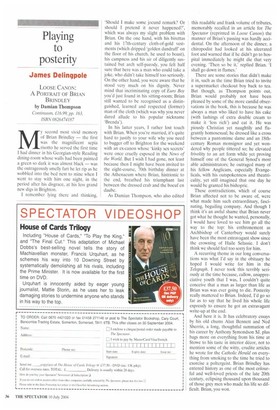Playing to posterity
James Delingpole
LOOSE CANON: A PORTRAIT OF BRIAN BRINDLEY by Damian Thompson Continuum, 06.99, pp. 163, ISBN 0826474187 1\4 y second most vivid memory of Brian Brindley — the first was the magnificent sepia risotto he served the first time I had dinner in his Georgian-style Reading dining-room whose walls had been painted a green so dark it was almost black — was the outrageously smelly fart he let rip as he wobbled into the bed next to mine when I went to stay with him one night, in the period after his disgrace, at his less grand new digs in Brighton.
I remember lying there and thinking,
'Should I make some jocund remark? Or should I pretend it never happened?', which was always my slight problem with Brian. On the one hand, with his birettas and his 17th-century cloth-of-gold vestments (which dripped 'golden dandruff' on the floor of his church, he used to boast), his campness and his air of diligently sustained but arch self-parody, you felt half sure that here was a man who could take a joke, who didn't take himself too seriously. On the other hand, you were aware that he stood very much on his dignity. Never mind that incriminating copy of Euro Boy you'd just found in his sitting-room; Brian still wanted to be recognised as a distinguished, learned and respected (former) man of the cloth (which was why you never dared allude to his popular nickname 'Brenda'). In his latter years, I rather lost touch with Brian. When you're married, it's quite hard to justify to your wife why you need to bugger off to Brighton for the weekend with an ex-canon whose 'kinky sex secrets' were once cruelly exposed in the News of the World. But I wish I had gone, not least because then I might have been invited to the eight-course, 70th birthday dinner at the Athenaeum where Brian, histrionic to the end, breathed his triumphant last between the dressed crab and the boeuf en daube.
As Damian Thompson, who also edited
this readable and frank volume of tributes, memorably recalled in an article for The Spectator (reprinted in Loose Canon) the manner of Brian's passing was hardly accidental. On the afternoon of the dinner, a chiropodist had looked at his ulcerated foot and warned that if he didn't go to hospital immediately he might die that very evening. 'Then so be it,' replied Brian. 'I shall go down in flames.' There are some stories that didn't make it in, such as the time Brian tried to invite a supermarket checkout boy back to tea. But though, as Thompson points out, Brian would probably not have been pleased by some of the more candid observations in the book, this is because he was always a man who liked to have his cake (with lashings of extra double cream to make it 'less rich') and eat it. He was piously Christian yet naughtily and flagrantly homosexual; he dressed like a cross between a pantomime dame and an 18thcentury Roman monsignor and yet wondered why people tittered so; he elevated frivolity to an art form while yet proving himself one of the General Synod's most able administrators; he outraged many of his fellow Anglicans, especially Evangelicals, with his outspokenness and theatricality, yet still imagined that one day he would be granted his bishopric.
These contradictions, which of course Brian affected not to be aware of, were what made him such extraordinary, fascinating, beguiling company. And though I think it's an awful shame that Brian never got what he thought he wanted, personally, I would have loved to see him go all the way to the top: his enthronement as Archbishop of Canterbury would surely have been the most extravagant show since the crowning of Haile Selassie. I don't think we should feel too sorry for him.
A recurring theme in our long conversations was what I'd say in the obituary he hoped I would write for him in the Telegraph. I never took this terribly seriously at the time because, callow, unappreciative youth that I was, I couldn't quite conceive that a man as larger than life as Brian was was ever going to die. Posterity really mattered to Brian. Indeed, I'd go so far as to say that he lived his whole life expressly to ensure he got an extravagant write-up at the end. And here it is. It has celebratory essays by his old chums Alan Bennett and Ned Sherrin, a long, thoughtful summation of his career by Anthony Symondson SJ, plus bags more on everything from his time at Stowe to his taste in interior decor, not to mention some of the witty, erudite articles he wrote for the Catholic Herald on everything from smoking to the time he tried to exorcise a poltergeist. Brian Brindley has entered history as one of the most colourful and well-loved priests of the late 20th century, eclipsing thousand upon thousand of those grey men who made his life so difficult. Brian, you won.


























































 Previous page
Previous page